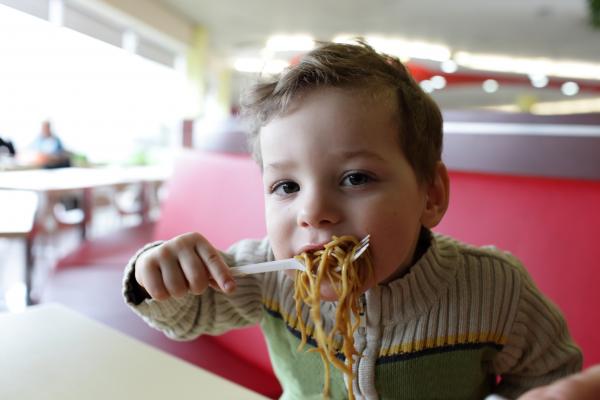So my son comes marching into the kitchen, and says in a demanding tone, "Make me snacks now!" My first reaction is to think that this is simply unacceptable behavior, and that he needs a good talking to. But I also notice that I am quite triggered by this, and that before I do anything, I need to reflect.
So I start boiling water for some pasta (I do have enough sense to know that when he asks for a snack that what his body really needs is some healthy food and not junk). As the water boils it dawns on me why he was so rude. In a word: metabolism.
It's amazing to me how much of our spiritual and emotional problems have clear biological and physical causes. The reason he was so demanding is that his body was hungry, and so his brain went into alarm mode:
I need food NOW .
The problem is not that he is a rude kid, it's that his metabolism was flooding his brain. If I had scolded him this would have had the effect of riling up his brain even more, which was already in freakout mode (I'll leave it to a neurobiologist to explain this with big $10 words like amygdala and cerebral cortex, but the basic science here is quite solid).
Now, that doesn't mean it's okay for us all to just bark orders at each other when we're hungry. None of us like getting yelled at, and just because we parents get yelled at on a semi-regular basis does not mean it doesn't get under our skin too. It's hard for us — even as adults — to overcome our natural self-defense mechanisms and not react by yelling back, "don't yell at me!"
A big part of maturing is learning how not to be driven by our emotions — how to respond thoughtfully, rather than reacting emotionally. If this is hard for me as an adult, it's understandable that my 8-year-old son can't always do this himself.
So what would the values of nonviolence applied here look like? It comes down to practically asking: What is needed here? The behavior is not okay, and so my instinct is to yell. But that would not have the outcome that I desire, and probably make things worse. Instead, giving him some food would allow his brain and body to come back to normal, so he could become the sweet boy he can be.
It's a simple and even mundane solution: Make some food. I certainly won't be getting any Nobel Peace Prizes for making pasta (in fact, what I got was "What, noodles again?"). But the big picture here is that when we are being yelled at, when we feel attacked or wronged, our instinct is to go right to the punitive. We can justify this response with all sorts of noble words, but really it's our emotions that are being triggered here, and our emotional reactions — no matter how much we wrap these in a mantle of noble or religious terms — simply do not always lead us to the good and harmonious outcome we desire.
So the simple practical question we need to ask in any given situation is: What is needed in order to help everyone's needs to be met? We especially need to be able to arrive at this when we are in the middle of conflict, when our emotions are running high, when we are feeling triggered, defensive, and perhaps even morally offended.
We have so few examples of this in our culture. Instead, we have pundits who scream at each other on the news, politicians who would rather shut down the government than go on record as agreeing with each other on anything, and movies and television shows that seem to know no other solution to any sort of conflict than resorting to violence — whether it's the spectacular battle scenes in The Lord of the Rings or the gritty cops on Chicago PD — we see this rehearsed over and over. Not as the last resort, but as apparently the only resort most scriptwriters can seem to come up with.
So in this morally impoverished vacuum, maybe the place where we can begin to learn this is in our ordinary everyday conflicts ... whether that's with our partner, our kids, at work, or even driving to work(!)
So now it's your turn: Rather than arguing in the comments section as per usual (and the ugly way we often interact with others on social networks is a proverbial "can of worms" all to itself!), instead, share some ways you've learned to diffuse conflict in your everyday life.
Derek Flood (TheRebelGod.com) is the author of Healing the Gospel and a featured blogger on the Huffington Post.
Image: Child eating noodles, Chubykin Arkady / Shutterstock.com
Got something to say about what you're reading? We value your feedback!
